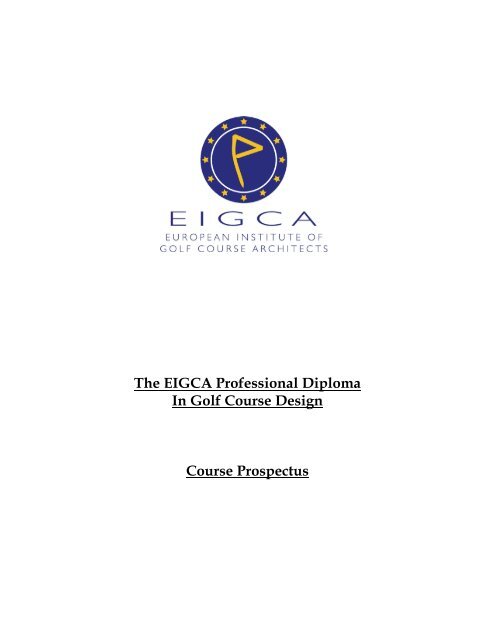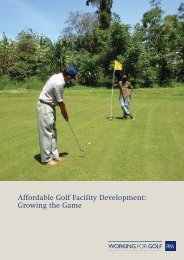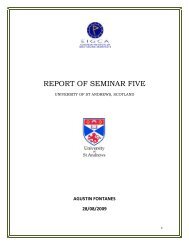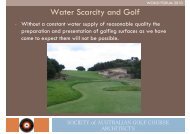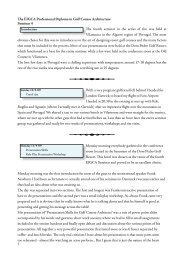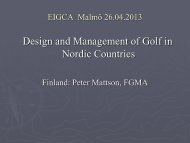The EIGCA Professional Diploma In Golf Course Design Course ...
The EIGCA Professional Diploma In Golf Course Design Course ...
The EIGCA Professional Diploma In Golf Course Design Course ...
You also want an ePaper? Increase the reach of your titles
YUMPU automatically turns print PDFs into web optimized ePapers that Google loves.
<strong>The</strong> <strong>EIGCA</strong> <strong>Professional</strong> <strong>Diploma</strong><br />
<strong>In</strong> <strong>Golf</strong> <strong>Course</strong> <strong>Design</strong><br />
<strong>Course</strong> Prospectus
- 2 -<br />
contents<br />
introduction 3<br />
page<br />
aims and objectives 5<br />
student personal development 8<br />
teaching and learning strategies 10<br />
programme structure 13<br />
assessment 15<br />
attendance 16<br />
curriculum and syllabus 17<br />
Appendix 1<br />
DRAFT TIMETABLE<br />
- 2 -
- 3 -<br />
1. introduction<br />
1.1 This Prospectus is designed to provide incoming students with a general<br />
introduction to the <strong>EIGCA</strong> <strong>Professional</strong> <strong>Diploma</strong> in <strong>Golf</strong> <strong>Course</strong> <strong>Design</strong> and the<br />
draft programme of study. It gives an overall review of the <strong>Professional</strong> <strong>Diploma</strong><br />
in <strong>Golf</strong> <strong>Course</strong> <strong>Design</strong> in relation to the Profession, outlines the content of the<br />
<strong>Course</strong>work, and explains the procedures for assessment and examination.<br />
1.2 <strong>Golf</strong> course architecture demands a wide diversity of skills and technical<br />
knowledge. Of utmost importance to the skills of a golf course architect is a<br />
thorough appreciation of landscape architecture and its application to the<br />
philosophy of planning and design of golf courses. Encompassing the necessary<br />
illustrative and drawing skills, it requires a comprehensive knowledge of the game<br />
of golf, a history of the origins and evolution of design for the game, and the<br />
environmental impacts of golf course construction.<br />
<strong>The</strong> science and technology elements have seen significant advances in the past<br />
30 years and golf course architects need to have a clear understanding of the<br />
relevant scientific principles in order to develop the practical ability to achieve the<br />
required standards of golf course provision.<br />
<strong>In</strong> recent years there has been a significant increase in awareness amongst golfers<br />
and spectators of the elements that constitute a challenging and environmentally<br />
sensitive golf course. <strong>The</strong> earning power of leading golf professionals and the<br />
willingness of players to subscribe to the game is also increasingly providing the<br />
funds to produce designs and playing surfaces of the highest standards.<br />
1.3 Students will be registered for the award: an <strong>EIGCA</strong> <strong>Professional</strong> <strong>Diploma</strong> in<br />
<strong>Golf</strong> <strong>Course</strong> <strong>Design</strong>. <strong>The</strong> <strong>Diploma</strong> is the only <strong>EIGCA</strong> accredited qualification in<br />
the profession.<br />
1.4 <strong>The</strong> <strong>Diploma</strong> is operated by <strong>The</strong> European <strong>In</strong>stitute of <strong>Golf</strong> <strong>Course</strong> Architects<br />
(<strong>EIGCA</strong>) and, on acceptance onto the <strong>Course</strong>; the student is registered as a<br />
Student of the European <strong>In</strong>stitute of <strong>Golf</strong> <strong>Course</strong> Architects, with the possibility<br />
on successful completion of the course and assessments to become an <strong>EIGCA</strong><br />
Graduate.<br />
1.5 <strong>The</strong> <strong>Professional</strong> <strong>Diploma</strong> in <strong>Golf</strong> <strong>Course</strong> <strong>Design</strong> is a part-time, primarily<br />
distance-learning diploma course. It has been designed to allow people from a<br />
range of disciplines to build on their existing knowledge to obtain an insight to the<br />
profession of the golf course architect.<br />
- 3 -
- 4 -<br />
1.6 <strong>The</strong> European <strong>In</strong>stitute of <strong>Golf</strong> <strong>Course</strong> Architects has excellent links with<br />
professional bodies and Governing Authorities throughout the World who support<br />
the development and spread of the game, improvement of standards of provision,<br />
and promote a professional advancement of golf course design. <strong>The</strong>se include <strong>The</strong><br />
R&A, the <strong>Golf</strong> Unions and Federations, research centres and education<br />
establishments, golf course management associations, golf course architecture<br />
societies, and design practices.<br />
1.7 <strong>The</strong> reasons for the need for the <strong>Diploma</strong> are as follows:<br />
No other <strong>EIGCA</strong> accredited <strong>Diploma</strong> in <strong>Golf</strong> <strong>Course</strong> Architecture<br />
exists at present.<br />
<strong>The</strong> future development of golf course architecture and therefore the<br />
demands of practices employing golf course architects will require<br />
well-qualified and skilled individuals.<br />
<strong>The</strong> scientific and technical innovations that have occurred in golf<br />
course design and construction now demands high calibre individuals<br />
to take the golf course architecture profession forward.<br />
<strong>The</strong>re is an increasing international demand for skilled golf course<br />
architects and this creates a wide range of opportunities for wellqualified<br />
and gifted individuals.<br />
- 4 -
- 5 -<br />
2. aims and objectives<br />
<strong>The</strong> principal aim of the course is to enable you to gain the fundamental skills and<br />
knowledge required for a career in golf course architecture, although it may also<br />
appeal to individuals who are simply pursuing an interest in the subject. It is<br />
designed to be as specific and comprehensive as possible in covering the normal<br />
roles of the <strong>Golf</strong> <strong>Course</strong> Architect but participation in the course will require a<br />
high level of background research and study to be carried out by you in your own<br />
time to fill in particular gaps in your own knowledge and augment the formal<br />
teaching elements of the programme. Some individual and group course tutoring<br />
will be available to help you with this aspect, together with some possible work<br />
placement (if deemed necessary and a suitable placement can be identified and<br />
secured).<br />
Objectives<br />
<strong>The</strong> key objectives deriving from this aim:<br />
To develop the capacity to synthesise the requirements of a project<br />
brief to produce high quality, sustainable design solutions.<br />
To be able to demonstrate understanding of the principles underlying<br />
the practises of golf course architecture.<br />
To apply a wide range of vocational knowledge and skill in the area of<br />
golf course architecture.<br />
To demonstrate a broad understanding of the relevant technology and<br />
current issues relating to golf course design, construction,<br />
maintenance, and management as they relate to a wide range of golfing<br />
facilities including private member, pay and play, and resort golf.<br />
To provide an opportunity to seek information and evaluate aspects of<br />
the profession in an informed manner.<br />
To provide an effective contribution to the development of a golf<br />
course architectural practice.<br />
To provide the basis to progress, after fulfilling the appropriate<br />
criteria, to the various categories of membership of <strong>EIGCA</strong>. On<br />
successful completion of the course of studies and assessments,<br />
students will invited to become <strong>EIGCA</strong> Graduates.<br />
- 5 -
- 6 -<br />
Aims of the <strong>Diploma</strong> Teaching<br />
To support the European <strong>In</strong>stitute of <strong>Golf</strong> <strong>Course</strong> Architects’ Mision<br />
Statement by offering high quality education to enhance the<br />
profesion’s profile.<br />
To provide support and leadership for the golf course architecture<br />
profession by providing potential employees who will lead the<br />
industry in the adoption and development of new technologies.<br />
To provide a learning environment that will encourage students to<br />
take responsibility for their own learning and develop individuals to<br />
their full potential. It is not the policy of the <strong>In</strong>stitute to foster a<br />
dependency culture, whereby students rely on <strong>EIGCA</strong> course tutors<br />
for information. On the contrary, it is a key aim of the programme to<br />
improve students’ self-reliance, self-discipline, and time management<br />
skills to the level required for them to practise professionally.<br />
To provide students with the opportunities to develop the range of<br />
skills (industrial, business, practical, managerial, and personal), and<br />
the underpinning academic knowledge to work successfully in the<br />
golf course architecture profession or to apply their skills elsewhere.<br />
To develop skills to enable students to communicate effectively to<br />
specialist and non-specialist audiences.<br />
To promote an awareness of the environmental and social<br />
responsibilities of the golf course architecture profession and an<br />
understanding of how these responsibilities can be met.<br />
<strong>The</strong> course is part-time and primarily distance-learning and the ability to study<br />
without supervision is assumed, including the ability to undertake independent<br />
research as necessary to fulfil project assignments.<br />
<strong>The</strong> <strong>EIGCA</strong> Vision<br />
<strong>The</strong> European <strong>In</strong>stitute of <strong>Golf</strong> <strong>Course</strong> Architects’ Vision is to be the best<br />
provider for lifelong learning, through:<br />
<strong>In</strong>spiring and enabling learners and their families to recognise and<br />
achieve their potential through partnership<br />
Supporting learners within a safe, caring and professional organisation<br />
Being flexible in order to meet the training, educational and leisure<br />
interests of individuals<br />
- 6 -
- 7 -<br />
Encouraging courtesy, respect and good citizenship; and<br />
Working effectively with community, industry and business locally,<br />
nationally and internationally.<br />
<strong>The</strong> <strong>EIGCA</strong>’S Values<br />
<strong>The</strong> <strong>EIGCA</strong>’s values are:<br />
To promote a civilised society through the personal qualities of:<br />
- politeness<br />
- courtesy<br />
- sensitivity<br />
- tolerance<br />
- respect<br />
- openness<br />
- valuing views and opinions; and<br />
to make the <strong>EIGCA</strong> seminars and course a happy place to work and<br />
study through demonstrating these personal qualities and through:<br />
- the quality and safety of the environment; and<br />
- the ease of physical and academic access for all<br />
- 7 -
- 8 -<br />
3. student personal development<br />
3.1 Student responsibility for learning<br />
You are expected to take responsibility for your personal development by active<br />
participation in the learning environment. Acting as a positive member of your<br />
course will help you and the <strong>EIGCA</strong> to ensure that you receive a respected<br />
qualification. <strong>The</strong>refore, although directed study is carried out through lectures,<br />
tutorials, practical work and assignments, you will only get the best out of your<br />
time and studies on the <strong>EIGCA</strong> <strong>Professional</strong> <strong>Diploma</strong> by proper organisation of<br />
your non-directed, private study time. If you are having problems with your<br />
studies, there is a lot of help available so ask your Personal Mentor or <strong>Course</strong><br />
Manager. Active participation with your peers on the course will take the form of:<br />
<strong>In</strong>vestigative work including use of books, journals, internet<br />
websites, and CAB abstracts<br />
Qualitative and quantitative analysis<br />
Group discussions<br />
<strong>In</strong>dividual and group presentations of paper, designs, PowerPoint<br />
displays, and assignment work<br />
<strong>The</strong>se activities will be in addition to the normal lecture, studio and practical<br />
programme. Within the initiative considerable emphasis will be placed on<br />
personal development planning. This will be encouraged and supported by the<br />
<strong>Course</strong> Manager and Personal Mentor. <strong>The</strong> Personal Mentor encourages the<br />
individual students to assess their own development in the following four areas:<br />
3.2 Enterprise Skills<br />
<strong>The</strong> management of the individual’s own role and responsibility.<br />
<strong>The</strong> efectivenes of the individual’s time management.<br />
<strong>The</strong> development of the individual’s career.<br />
<strong>The</strong> ability to gain and transfer new skills in changing situations<br />
and contexts.<br />
<strong>The</strong> <strong>EIGCA</strong> is keen to support the nationally recognised Enterprise initiative that<br />
encompasses the range of personal development common skills. <strong>The</strong> students are<br />
encouraged to develop effective and efficient learning methods. <strong>The</strong>se can be<br />
- 8 -
- 9 -<br />
summarised under the four headings of problem solving, team working,<br />
presentation, and communication skills.<br />
Problem Solving<br />
<strong>The</strong> use of information sources.<br />
Dealing with a combination of routine and non-routine tasks.<br />
<strong>The</strong> identification and solving of routine and non-routine problems.<br />
Applying numerical skills and techniques.<br />
Team Working<br />
<strong>The</strong> treatment of others’ values, beliefs and opinions with respect.<br />
<strong>The</strong> ability to relate to and interact effectively with individuals and groups.<br />
Work effectively as a member of a team.<br />
Presentation<br />
Presenting information in a variety of visual forms.<br />
Using a range of technological equipment and systems.<br />
Communication Skills<br />
Receiving and responding to a variety of information.<br />
Communicating in writing.<br />
Participating in oral and non-verbal communication.<br />
Enterprise skills, where possible, will be monitored and assessed within the<br />
period of each seminar; during group and individual exercises; and through<br />
submission of assignment work. Certain enterprise skills will form part of the<br />
normal assessment process.<br />
3.3 Personal Record<br />
Throughout the period of the course, you will be encouraged to<br />
maintain an up to date record of your skills and experience in order to<br />
prepare you for your next career steps. <strong>The</strong> <strong>Course</strong> Manager and<br />
Personal Mentor will provide you with help and guidance during this<br />
process.<br />
- 9 -
- 10 -<br />
4. teaching and learning strategies<br />
4.1 Range of teaching<br />
<strong>The</strong> teaching and learning strategies are student-orientated and students are<br />
actively encouraged to be responsible for their own learning. Wherever possible a<br />
partnership is sought between students, tutors and external agencies, to ensure an<br />
integrated student-centred delivery with opportunities to tackle work-based and<br />
work-related problems in realistic situations.<br />
Teaching and learning strategies are varied and include traditional lectures and<br />
studio exercises, as well as discussions and a workshop approach that allows you<br />
to develop your own interests. <strong>The</strong>re is extensive use of visits to local sites and<br />
businesses for case studies and general observation. Other visits may involve local<br />
and national exhibitions, centres of interest, and major golfing venues.<br />
<strong>The</strong>re is comprehensive use of group seminars and tutorials to enhance formal<br />
classroom-based sessions. Small group and individual consultations aid<br />
understanding, enhance integration, and allow students to develop their own<br />
interests through a negotiated action plan.<br />
4.2 Oral Presentations<br />
Throughout each seminar students are expected to make oral presentations of their<br />
work to examiners, tutors, and their peer group. <strong>The</strong>se are aimed at developing a<br />
student’s confidence and presentation skils and are vital competences of<br />
professional golf course architects.<br />
4.3 Types of Assignment<br />
<strong>The</strong> types of assignment employed include short analytical projects, design briefs<br />
and case studies. An assessment schedule is kept by the <strong>EIGCA</strong> Education Board<br />
to ensure a balance of assesment methods and to regulate the students’ workload.<br />
<strong>The</strong> <strong>EIGCA</strong> Education Board meets regularly to review the teaching and learning<br />
strategy and to identify opportunities to enhance the learning process. <strong>The</strong> <strong>EIGCA</strong><br />
<strong>Professional</strong> <strong>Diploma</strong> in <strong>Golf</strong> <strong>Course</strong> <strong>Design</strong> <strong>Course</strong> Committee also meets<br />
regularly to review current student workloads, assignment briefs and assessment<br />
criteria to ensure attainable goals and adequate resources to achieve the required<br />
standard of performance.<br />
4.4 <strong>EIGCA</strong> Personal Mentors<br />
On entry to the programme, students are allocated a Personal Mentor who is an<br />
<strong>EIGCA</strong> Member and practicing golf course architect. <strong>The</strong> Personal Mentor<br />
- 10 -
- 11 -<br />
supports the student’s learning experience throughout the course by ofering<br />
technical advice, skills development and career guidance in the form of tutorials.<br />
4.5 Tutorial Support<br />
Both individual and group tutorials are an important part of a student’s learning<br />
experience. Tutorials are used to inform, develop and enhance technical<br />
competence and Enterprise Skills, and to provide the student with pastoral<br />
support.<br />
Three main types of tutorials are identified:<br />
4.6 Work Experience<br />
Group tutorials with the <strong>Course</strong> Manager, where information regarding<br />
overall <strong>Diploma</strong> programme delivery is given and feedback takes<br />
place. Issues of relevance to all students is included, e.g., Enterprise<br />
Skills, academic regulations, assessment, policy, and services via the<br />
<strong>EIGCA</strong> Education Board and Head Office. <strong>The</strong>se tutorials will also<br />
cover specific aspects of skills such as information technology, report<br />
writing and working in groups. <strong>The</strong> <strong>Course</strong> Manager will also deal<br />
with subject specific issues of career awareness and related job skills.<br />
Tutorials with individual Personal Mentors, which are of a pastoral<br />
nature and support all aspects of your studies. <strong>The</strong>se tutorials are<br />
normally conducted by telephone or email and may be instigated by<br />
either the Personal Mentor or by the student.<br />
Subject-based tutorials to enhance learning or to develop programme<br />
work, and to assist the integration of the programme. <strong>The</strong> <strong>Course</strong><br />
Manager or members of the <strong>EIGCA</strong> Education Board may conduct<br />
these tutorials.<br />
As part-time students, some in positions of authority and responsibility, you will<br />
be able to bring accumulated knowledge and experience of golf course<br />
architecture to the taught sessions. This is actively encouraged and the free<br />
exchange of information and ideas forms an essential element of the <strong>EIGCA</strong><br />
<strong>Professional</strong> <strong>Diploma</strong> experience.<br />
Work experience is an essential part of professional development and students are<br />
expected to secure as much practical involvement in a working golf course design<br />
practice as possible. It is expected that work experience will normally be related<br />
to golf course architecture. However, the <strong>EIGCA</strong> acknowledges that employment<br />
in other related vocational areas can provide opportunities for reflective practice.<br />
- 11 -
- 12 -<br />
<strong>The</strong> work experience provides additional opportunities for a student to develop a<br />
range of skills and knowledge, particularly those described by the <strong>EIGCA</strong><br />
<strong>Professional</strong> <strong>Diploma</strong> in <strong>Golf</strong> <strong>Course</strong> <strong>Design</strong> programme outcomes:<br />
Display the attribute, skills, behaviour and attitudes required in<br />
working life, in the workplace<br />
Learn independently and display the skills of professional scholarship<br />
required for personal development, career management and lifelong<br />
learning, or…<br />
Demonstrate the ability to establish effective working relationships<br />
with others, defining, sharing and delegating responsibility within a<br />
group<br />
Identify areas for personal and professional development<br />
4.7 Securing Work Experience<br />
It is the student’s responsibility to secure appropriate and adequate work<br />
experience. However, in exceptional circumstances, the <strong>EIGCA</strong> Education Board<br />
may assist in gaining the necessary experience by soliciting <strong>EIGCA</strong> Members and<br />
other pertinent golf course design practices and individuals. Whilst the <strong>EIGCA</strong><br />
Education Board will make every effort to secure suitable work experience for<br />
those students deemed eligible, it cannot be held responsible for providing such a<br />
placement. <strong>The</strong> ultimate responsibility for gaining the necessary work experience<br />
lies with the student. No reliance should be placed on the efforts and assistance of<br />
the <strong>EIGCA</strong>, the <strong>EIGCA</strong> Education Board or any of its staff, members, tutors or<br />
representatives.<br />
- 12 -
- 13 -<br />
5 programme structure<br />
5.1 Basic Format of the Programme<br />
<strong>The</strong> <strong>Professional</strong> <strong>Diploma</strong> in <strong>Golf</strong> <strong>Course</strong> <strong>Design</strong> consists of 5 seminars, each<br />
lasting 2 weeks, with a variety of tuition methods being adopted each day. <strong>The</strong><br />
course will run over a 24-month period. Approximately half of each seminar<br />
period is devoted to design studies and practise. Details of the programme are<br />
included in the following section.<br />
5.2 Student <strong>In</strong>duction<br />
<strong>The</strong> commencement of the first seminar of the programme forms a vital part of<br />
the induction process that plays a very important role in assisting you to come to<br />
terms with your new learning experience and environment. Whilst recognising<br />
this induction and orientation process is ongoing, the induction period<br />
nevertheless lays the foundation of a good working relationship between <strong>EIGCA</strong><br />
staff, tutors and students. This is essential if you are to gain the maximum benefit<br />
from the programme.<br />
<strong>The</strong> student induction session will include an introduction to the <strong>EIGCA</strong> facilities<br />
and procedures as well as to the syllabus and content of the programme.<br />
<strong>The</strong> Student <strong>In</strong>duction programme includes an explanation of:<br />
<strong>The</strong> pastoral and counselling roles of the <strong>EIGCA</strong> Head Office Staff,<br />
<strong>EIGCA</strong> Education Board, <strong>Course</strong> Manager, Module Tutor and Personal<br />
Mentor so that students know who to communicate with, if necessary.<br />
<strong>The</strong> rationale of the programme, its aims and objectives, the<br />
responsibilities of the <strong>EIGCA</strong>, the role of the staf and the student’s own<br />
responsibilities.<br />
<strong>The</strong> <strong>EIGCA</strong> Education Programme calendar and the student’s<br />
commitment to the programme including attendance, and protocol for<br />
assignment and coursework.<br />
<strong>The</strong> <strong>EIGCA</strong> learning resources including its library and student support<br />
services.<br />
Safety awareness.<br />
During the initial seminar following student induction onto the programme<br />
students will have an individual tutorial with the <strong>Course</strong> Manager. At this time<br />
- 13 -
- 14 -<br />
goals and aspirations are discussed, individual strengths and weaknesses are<br />
considered and action plans are drawn up.<br />
5.3 Assignments<br />
During the <strong>Course</strong> students will have to submit a number of compulsory<br />
assignments covering the taught topics. <strong>The</strong> work on assignments that are subject<br />
to marking will mainly be carried out between the seminars.<br />
Topics taught:<br />
No. of Assignments<br />
<strong>Design</strong> Projects 5<br />
<strong>Design</strong> Essays 3<br />
History Essays 2<br />
Technical Essays 2<br />
Over the period of the course each student will submit 12 assignments in total.<br />
<strong>The</strong> Final <strong>Design</strong> Project will be exhibited at the <strong>EIGCA</strong> AGM for viewing and<br />
discussion with the membership.<br />
- 14 -
- 15 -<br />
6. assessment<br />
6.1 <strong>The</strong> assessment of all topics will be by a series of compulsory assignments<br />
completed by the students between the seminars and handed-in on a fixed date.<br />
6.2 All course work and marks are subject to review by <strong>EIGCA</strong> Education Board and<br />
External Examiners at the end of the course.<br />
6.3 Grading Bands for each project are as follows:<br />
Grade Mark Band Description<br />
A++<br />
A+<br />
A<br />
90% - 100%<br />
80% - 89%<br />
70% - 79%<br />
Distinction: outstanding work, excelling in<br />
all aspects<br />
B 60%–69% Merit: commendable work<br />
C 50% - 59% Pass: competent in all key elements<br />
D 30% - 49% Referral: lacking competence in some key<br />
elements. Resubmission of weak elements<br />
F Less than 30% Fail: lacking competence in the majority of<br />
key elements. Poor quality work.<br />
Resubmission of all elements of the<br />
assignment<br />
6.4 A student who fails to meet the specified deadline for any project can obtain only<br />
a maximum score of 50 for any work subsequently handed-in.<br />
6.5 Marking criteria are specific to each assignment. <strong>The</strong>y will be provided at the<br />
outset of all written assignments and design projects.<br />
- 15 -
- 16 -<br />
7. attendance<br />
7.1 Students are expected to be in attendance for all modules as defined by the dates<br />
set out below. Travel, holiday, and work arrangements should be planned<br />
accordingly to allow for full attendance. Failure to attend any seminar or a part of<br />
one will be taken into account in the overall assessment.<br />
7.2 Module dates for the academic years 2009 - 2011 are provisionally as follows:<br />
Module 1 (2 weeks)<br />
September 2009<br />
Module 2 (2 weeks)<br />
April 2010<br />
Module 3 (2 weeks)<br />
September 2010<br />
Module 4 (2 weeks)<br />
April 2011<br />
Module 5 (2 weeks)<br />
August 2011<br />
- 16 -
- 17 -<br />
8. curriculum and syllabus<br />
<strong>The</strong> following five modules are, provisionally, planned:<br />
OPENING MODULE<br />
SURREY, ENGLAND<br />
- THE GLOBAL GOLF MARKET<br />
- GOLF DEVELOPMENT TRENDS<br />
- INTRODUCTION TO THE PROFESSION<br />
- INTRODUCTION TO <strong>EIGCA</strong><br />
- DRAWING SKILLS<br />
- COMPUTER LITERACY<br />
- HISTORY OF GOLF COURSE ARCHITECTURE AND THE ARCHITECTS<br />
- PRINCIPLES OF ROUTEING, LAYOUT, SAFETY, STRATEGY<br />
- CONSTRUCTION TECHNIQUES<br />
- PLANNED VISITS (SUBJECT TO CONFIRMATION):<br />
Sunningdale G. C.<br />
Hankley Common G. C.<br />
Woking G. C.<br />
Worplesdon G. C.<br />
West Hill G. C.<br />
<strong>The</strong> Berkshire G. C.<br />
<strong>The</strong> Wisley Club<br />
Queenwood G. C.<br />
- BETWEEN THE OPENING AND SECOND SEMINAR<br />
Private Study work: - essay on history, one specified architect,<br />
routeing project on an existing course<br />
- 17 -
- 18 -<br />
THE SECOND MODULE<br />
KEMPEN, GERMANY<br />
- PLANNING - THE GERMAN SYSTEM<br />
- LANDSCAPE DESIGN PRINCIPLES<br />
- INTRODUCTION TO DETAILED DESIGN, INCLUDING DRAINAGE AND<br />
EARTHWORKS<br />
- THE FLL SPECIFICATION AND CONSTRUCTION TECHNIQUES<br />
- GREEN, TEE, 3 HOLE DESIGN INCLUDING CLAY MODELLING<br />
- INTRODUCTION TO DISSERTATION<br />
- PLANNED VISITS (SUBJECT TO CONFIRMATION) TO:<br />
Hosel<br />
Hubbelrath<br />
Koln Refrath<br />
DGC courses in vicinity<br />
- BETWEEN THE THIRD AND FOURTH SEMINARS<br />
Private Study work - design of golf course in hilly terrain, greens designs<br />
project, eclogy assignment, essay on recommended specifications -<br />
USGA, STRI, California<br />
- 18 -
- 19 -<br />
THE THIRD MODULE<br />
DUBLIN, IRELAND<br />
- INTRODUCTION TO SOIL SCIENCE, TURF CULTURE, GRASSES, DRAINAGE, SOIL<br />
TESTING<br />
- HAZARDS AND BUNKER DESIGN<br />
- WOODLAND MANAGEMENT<br />
- SITE ASSESSMENT, PLANNING A LIVE PROJECT ON NEW LAND<br />
- LAYOUT DESIGN<br />
- SPECIFICATIONS, BILLS OF QUANTITIES, AND COSTINGS<br />
- PLANNED VISITS (SUBJECT TO CONFIRMATION) TO:<br />
<strong>The</strong> K Club<br />
Royal Dublin G. C.<br />
Island <strong>Golf</strong> Club<br />
<strong>The</strong> Heritage <strong>Golf</strong> & Spa Resort<br />
County Louth G. C.<br />
- BETWEEN THE SECOND AND THIRD SEMINARS<br />
Private Study work - layout project development, 3 hole detailed design<br />
with drainage and quantification<br />
- 19 -
- 20 -<br />
THE FOURTH MODULE<br />
ALGARVE, PORTUGAL<br />
- WARM SEASON GRASS TECHNOLOGY<br />
- INTRODUCTION TO WATER MANAGEMENT & IRRIGATION<br />
- ENVIRONMENTAL MANAGEMENT OF GOLF COURSES<br />
- DEVELOPMENT OF GOLF RESORTS<br />
- DESIGN OF RESORT GOLF COURSES<br />
- CONSTRUCTION AND IRRIGATION<br />
- GREEN DESIGN, EARTHWORKS<br />
- INTRODUCTION TO THE MAIN DESIGN PROJECT<br />
- PRESENTATION OF DISSERTATION RESEARCH<br />
- PLANNED VISITS (SUBJECT TO CONFIRMATION) TO:<br />
Vilamoura<br />
Victoria <strong>Course</strong><br />
Millennium<br />
<strong>The</strong> Old <strong>Course</strong><br />
Quinta do Lago<br />
Amendoeira<br />
Faldo <strong>Course</strong> &O’Connor Jnr <strong>Course</strong><br />
- BETWEEN THE FOURTH AND FINAL SEMINARS<br />
Private study work - essay on philosophies of hazard positioning, main<br />
design project and dissertation<br />
- 20 -
- 21 -<br />
THE FINAL MODULE<br />
ST. ANDREWS, FIFE, SCOTLAND<br />
- TECHNICAL SPECIFICATIONS<br />
- GOLF COURSE MANAGEMENT<br />
- GOLF COURSE MAINTENANCE<br />
- MAINTENANCE MACHINERY<br />
- HABITAT CREATION AND MANAGEMENT<br />
- CONTRACT LAW<br />
- HEALTH AND SAFETY/CDM<br />
- PROFESSIONAL PRACTICE AND THE REAL WORLD<br />
- VISIT TO R AND A CLUBHOUSE<br />
- THE R&A ROLES, RULES, RESPONSIBILITIES<br />
- PRESENTATION OF FINAL PROJECT<br />
- PRESENTATION OF DISSERTATION<br />
- PLANNED VISITS (SUBJECT TO CONFIRMATION) TO:<br />
St Andrews Old <strong>Course</strong><br />
Castle <strong>Course</strong><br />
Kingsbarns<br />
St Andrews Bay<br />
Crail<br />
Leven<br />
Ladybank<br />
Carnoustie<br />
- 21 -
DRAFT TIMETABLE FOR THE <strong>EIGCA</strong> DIPLOMA COURSE<br />
SUBJECT<br />
OPENING<br />
WINTER<br />
1 SUMMER<br />
WINTER<br />
2 FINAL TOTAL <strong>EIGCA</strong> Martyn Other Partner<br />
HOURS Members Jones teaching colleges<br />
GENERAL<br />
Registration & introduction 1.5 1.5 0 1.5 0<br />
Library introduction & study 6 6 0 0 6<br />
Report writing & research methods 1.5 1.5 0 1.5 0<br />
Graphics (including CAD) 9 3 6 18 6 0 6<br />
Dissertation 3 3 6 12 9 3 0<br />
Future Markets 1.5 1.5 0 0 1.5<br />
HISTORY<br />
History of <strong>Golf</strong> <strong>Course</strong> Architecture 18 18 6 12 0<br />
<strong>Golf</strong> <strong>Course</strong> Assesment & Improvement 18 18 18 0 0<br />
DESIGN<br />
Site Assessment & Analysis 3 3 3 0 0<br />
Landscape <strong>Design</strong> Principles 3 3 6 6 0 0<br />
Layout <strong>Design</strong> 15 27 4.5 12 58.5 52.5 0 6<br />
Earthworks <strong>Design</strong> 6 19.5 15 40.5 40.5 0 0<br />
Surveying 9 9 3 0 0<br />
Quantification 3 3 3 0 0<br />
Construction Techniques 6 3 6 15 6 9 0<br />
Main <strong>Design</strong> Project 18 6 24 14 10 0<br />
ENVIRONMENTAL SCIENCE<br />
<strong>In</strong>troduction to Soils & Geology 3 3 0 3 0<br />
Planning 3 3 6 6 0 0<br />
Drainage 9 9 9 0 0<br />
Irrigation 6 6 0 0 6<br />
Agronomy 6 6 12 0 12 0<br />
Habitat Creation & Management 3 3 3 9 6 0 3<br />
Greenkeeping 6 6 0 0 0<br />
PROFESSIONAL PRACTICE<br />
Contract Law & <strong>Professional</strong> <strong>In</strong>demnity 3 3 0 0 3<br />
Forms of Contract 1.5 1.5 1.5 0 0<br />
Health & Safety 1.5 1.5 1.5 0 0<br />
Specification 6 6 6 0 0<br />
Role of Contractor 1.5 1.5 0 0 1.5<br />
60 60 60 60 60 300 197 52 33 18


